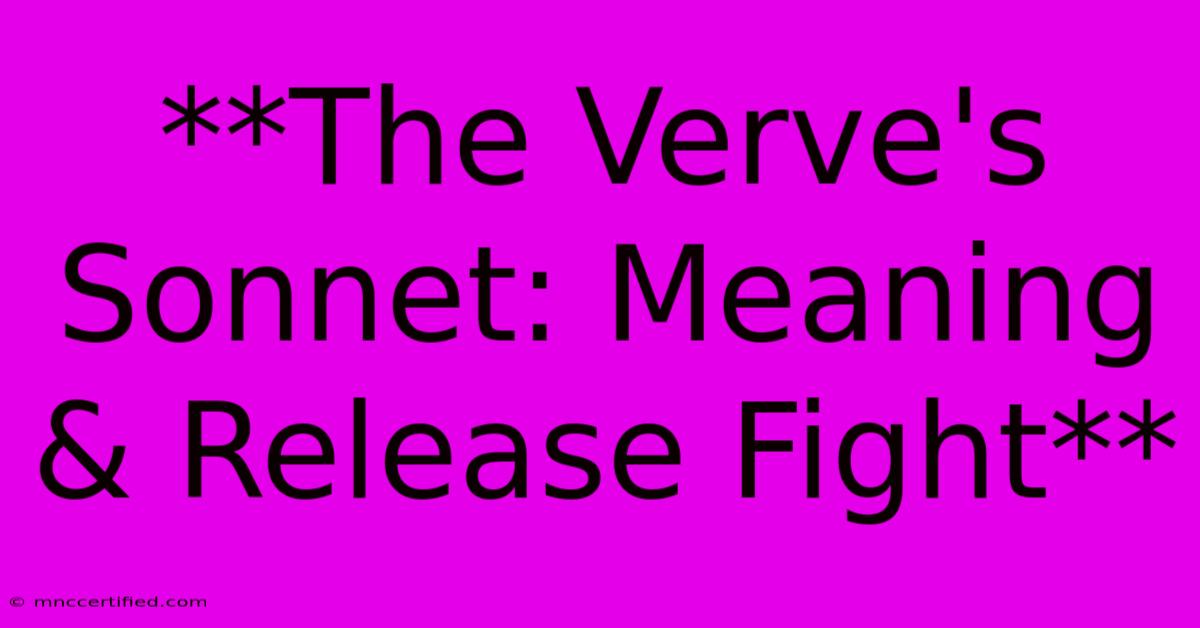**The Verve's Sonnet: Meaning & Release Fight**

Table of Contents
The Verve's Sonnet: Meaning & Release Fight
The Verve's "Sonnet" is more than just a song; it's a sonic masterpiece that captures the band's artistic struggle, their desire for control, and the raw power of their musical vision. Released in 1997, it became a defining moment for the band and a cornerstone of the Britpop movement. However, its path to release was fraught with tension and controversy, mirroring the complexities of the band's internal dynamics.
The Meaning of "Sonnet"
The song's lyrics are deeply personal and introspective, reflecting lead singer Richard Ashcroft's struggle with fame and his yearning for creative freedom. The song's title itself alludes to the traditional sonnet form, a 14-line poem with a specific rhyme scheme and structure. This connection highlights the song's lyrical density and its exploration of complex emotions.
Key themes in "Sonnet" include:
- Yearning for control: The opening lines, "I'm gonna take the reins," convey Ashcroft's desire to steer his own destiny, both in his personal life and his musical career.
- Struggle with fame: The song reflects the pressures and scrutiny that come with being a successful artist. Lines like "I don't want to be a puppet on a string" reveal Ashcroft's resistance to being manipulated and controlled.
- Inner turmoil: The song delves into the internal conflict and emotional turmoil that Ashcroft experiences, questioning his purpose and seeking meaning in a chaotic world.
The Release Fight: A Battle for Artistic Control
While "Sonnet" is a powerful testament to The Verve's musical genius, its release was a tumultuous journey marked by tension between the band and their record label, Virgin Records.
The song was originally intended for the band's second album, "A Storm in Heaven," but it was deemed too experimental and risky by the label. Virgin Records wanted The Verve to follow the path of their commercially successful debut album, "A Northern Soul." However, the band fought to release "Sonnet," refusing to compromise their artistic vision.
This battle for creative control led to a tense standoff, with The Verve threatening to leave Virgin Records if the label refused to release the song. Ultimately, the label relented, understanding that "Sonnet" was crucial to the band's artistic integrity.
Legacy of "Sonnet"
The release of "Sonnet" proved to be a pivotal moment for The Verve. It became a critical and commercial success, solidifying their position as one of the most important bands of the 1990s.
The song's impact can be seen in:
- Reinforced artistic integrity: The Verve's successful fight to release "Sonnet" demonstrated their commitment to artistic integrity and their refusal to be dictated by commercial pressures.
- Influence on Britpop: "Sonnet" helped to redefine the boundaries of Britpop, showcasing a more experimental and introspective side to the movement.
- Enduring legacy: The song remains a timeless masterpiece, resonating with listeners for its raw emotionality and haunting melody.
Conclusion
"Sonnet" stands as a testament to The Verve's artistic vision, their unwavering determination, and their ability to create music that transcends time and genre. Its release was a struggle, but the band's victory cemented their legacy as a band who refused to compromise their art for commercial success. The song continues to inspire and resonate with audiences today, proving that sometimes, the greatest art comes from a battle for artistic freedom.
Keywords: The Verve, Sonnet, Richard Ashcroft, Britpop, artistic control, release fight, Virgin Records, meaning, lyrics, legacy, music, 1990s, song analysis, musical genius.

Thank you for visiting our website wich cover about **The Verve's Sonnet: Meaning & Release Fight**. We hope the information provided has been useful to you. Feel free to contact us if you have any questions or need further assistance. See you next time and dont miss to bookmark.
Featured Posts
-
Rob Jackson Insurance American Fork
Nov 14, 2024
-
Whoopi Goldberg Birthday Cake Order Dispute
Nov 14, 2024
-
Bridget Jones Mad About The Boy As The Third Book
Nov 14, 2024
-
Insurance Overpayment Refund Letter
Nov 14, 2024
-
Pacific Star Insurance Phone Number
Nov 14, 2024